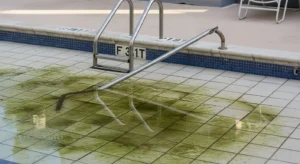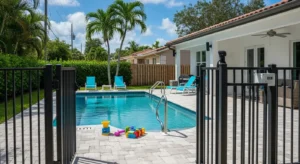Fort Lauderdale Swimming Pool Accident Lawyer | Englander Peebles
A day by the pool isn’t supposed to end in panic, sirens, or ICU visits. But when a property owner cuts corners on safety—or fails to fix a hazard they knew about—that’s exactly what can happen.
If someone you love suffered a serious injury or drowning at a private, hotel, or public pool, a Fort Lauderdale swimming pool accident lawyer at Englander Peebles may be able to help you hold the right parties accountable.
These incidents are rarely accidents in the true sense of the word. They often involve broken gates, unsecured drains, missing safety equipment, or chemical exposure—all of which could have been prevented. And in Florida, where pool regulations are strict and liability laws are clear, that matters.
Under Florida law, the statute of limitations for personal injury claims—including swimming pool injuries—is generally four years from the date of the accident. Acting within this timeframe is pivotal to preserving your legal rights.
Call (954) 226-9134 today. The sooner you reach out, the sooner our experienced pool accident attorneys can help you move forward.
Why Choose Englander Peebles As Your Fort Lauderdale Pool Accident Advocate
Pool injury cases can be highly complex, and swift legal action is often essential. Injury victims in Fort Lauderdale place their trust in our firm for several important reasons.
We bring proven experience in handling Florida pool accident and premises liability claims, backed by a strong record of successful outcomes. Our legal team possesses in-depth knowledge of local building codes, state statutes, and relevant case law, enabling us to navigate even the most challenging legal issues effectively.
We offer aggressive representation against negligent parties, including property owners, hotels, municipalities, and insurance companies, ensuring that our clients’ rights are fully protected. At the same time, we provide compassionate support to families coping with trauma, mounting medical expenses, and the emotional toll of a serious injury or loss.
Contact Premises liability lawyer at Englander Peebles at (954) 226-9134 today—we’re ready to help you take the next step toward recovery and accountability.
Slippery Surfaces and Poor Maintenance

Decks covered in algae, broken tiles, loose ladders, and uneven pavement often lead to slip and fall injuries. Public pools and older apartment complexes are especially prone to these issues when regular upkeep is skipped.
Diving into Shallow Water
Spinal cord injuries often happen when diving boards are installed over shallow ends—or when there’s no clear signage warning swimmers. Shallow diving accidents are a known risk at many residential and hotel pools in Fort Lauderdale.
Drain Entrapment Incidents
Defective or unsecured drains create powerful suction. Children and even adults have been trapped underwater, leading to drowning or internal injuries. The Virginia Graeme Baker Pool & Spa Safety Act—a federal law—sets specific standards to prevent these hazards, but it primarily applies to public pools and spas, not private residential pools.
Electrical Hazards
Exposed wires, broken pool lighting, or outdated electrical systems can cause electrocution. These hazards are more common in older pools or budget properties where electrical work isn’t routinely inspected.
Chemical Burns and Toxic Exposure
Improper pH balance and excessive chlorine use can cause chemical burns, rashes, and respiratory damage. This is particularly common when pool chemicals are stored incorrectly or handled by untrained staff.
Inadequate Supervision
A missing or distracted lifeguard at a public pool, or complete lack of supervision at a private one, drastically increases the chances of injury. Drownings and near-drownings often occur when no one is watching the water.
Missing or Defective Safety Features

Florida law is clear: under the Florida Residential Swimming Pool Safety Act, all residential pools must have at least one barrier—such as a self-latching gate, pool cover, or alarm. Failure to follow this law may be considered negligence per se, meaning the violation itself can be used as proof of legal fault. Many Airbnb and vacation rental properties ignore these requirements, creating dangerous conditions for young children.
Who Is Liable for Swimming Pool Injuries in Florida?
Liability for pool-related injuries depends on who owned or controlled the property and whether they failed to meet a legal duty of care. In Florida, this is governed by premises liability law, which holds property owners responsible for injuries caused by dangerous conditions they knew or should have known about.
Homeowners may be liable if a child drowns in a backyard pool with no barrier or safety alarm. Hotel operators might be responsible for injuries at resort pools with broken fences or inattentive lifeguards. While private pool owners face liability under state law, public entities are governed by separate legal standards.
For public pools like the Fort Lauderdale Aquatic Center or Bass Park Pool, liability may fall under sovereign immunity laws, which require early notice and impose damage caps. If your case involves a city-owned pool, strict notice rules may apply—making it critical to consult an attorney as soon as possible.
Florida also follows a pure comparative negligence rule, meaning that if an injured person is found partially at fault—such as by ignoring posted signs—their compensation may be reduced in proportion to their degree of fault.
Property management companies and third-party contractors may also face legal exposure if their actions (or lack of action) contributed to the injury.
Florida Swimming Pool Injury Laws and Safety Regulations
Florida law outlines specific safety requirements for residential pools. The Florida Residential Swimming Pool Safety Act mandates at least one approved safety measure such as a barrier, self-latching gate, or pool alarm. Violating this law may establish negligence per se, making it easier for the injured party to prove liability.
Premises liability principles determine the level of care owed to guests, tenants, and others. This standard is higher when the injured party is an invited guest. Under the attractive nuisance doctrine, property owners may still be liable for injuries to children—even if the child was trespassing—because pools are considered inherently dangerous and enticing.
If a government-run facility was involved, claims must comply with Florida’s tort claims statute, which includes strict notice requirements and limitations on damages.
What Happens After a Swimming Pool Injury?

Once emergency care is over, most families feel overwhelmed. The next step is collecting evidence. Collect photos of the pool area, contact details of witnesses, and any available surveillance footage. Property maintenance logs may show whether safety checks were skipped or repairs delayed.
Medical documentation is critical. Keep records of hospital visits, diagnoses, specialist referrals, and rehabilitation plans. These help establish the injury’s severity and the expected recovery path.
A Fort Lauderdale swimming pool accident lawyer may assess liability by reviewing property records, safety violations, and pool ownership details. This matters because different legal rules apply depending on whether the pool was public, private, or part of a commercial property like a hotel or gym.
Finally, insurance companies will get involved. They may offer a quick settlement—or deny liability entirely. Working with a swimming pool injury attorney helps level the playing field and builds leverage to seek appropriate compensation.
Public and Hotel Pool Injury Cases in Fort Lauderdale
Pool accidents don’t just happen at home. Public facilities like the PJ Meli Park Aquatic Complex, community centers, and city-run aquatic centers are subject to their own safety protocols. If those aren’t followed, injuries may happen—and the city could be liable.
Hotel pools are another hotspot for injury claims. Tourists staying in South Beach or downtown Fort Lauderdale may not realize the pool has no lifeguard, slippery decking, or poorly marked depth levels. Vacation rentals often lack adequate fencing or pool alarms, creating hazards for children.
No matter where it happened, local knowledge of Broward County building codes and safety laws may strengthen your case.
FAQs for Fort Lauderdale Swimming Pool Accident Lawyers
1. What should I do immediately after a pool accident?
After seeking emergency medical care, document the scene if possible. Take photos of the pool area, any hazards (like broken gates or missing signage), and gather names and contact info of witnesses. Save all medical records and receipts related to the injury. Then, contact a personal injury attorney to begin investigating liability and preserving evidence.
2. Who can be held liable for a swimming pool injury?
Liability may fall on homeowners, hotel operators, landlords, or even government entities, depending on who controlled the property and whether they breached a duty of care. Under Florida’s premises liability laws, property owners can be held accountable if they knew or should have known about a dangerous condition and failed to fix it.
A swimming pool accident lawyer can help determine who was legally responsible based on ownership, control of the premises, and the specific circumstances of your case.
3. How long do I have to file a lawsuit in Florida?
In most cases, you have four years from the date of the injury to file a personal injury lawsuit. However, government claims have shorter deadlines and strict notice requirements. It’s crucial to speak with an attorney as soon as possible to avoid missing critical deadlines.
4. What if my child was injured while trespassing on someone else’s property?
Florida’s attractive nuisance doctrine may still hold a property owner liable if a child was injured by a hazardous feature like a pool. Pools are considered inherently dangerous and attractive to children, meaning owners must take reasonable precautions—such as fences and alarms—to prevent access.
5. What damages can I recover in a pool accident lawsuit?
You may be entitled to compensation for medical bills, rehabilitation, lost wages, pain and suffering, and emotional distress. In fatal incidents, surviving family members may pursue wrongful death damages for funeral costs and loss of companionship.
6. Will my case settle, or go to trial?
Most swimming pool injury claims settle before trial, especially when there’s clear evidence of negligence. However, if the insurer refuses a fair offer, your attorney may recommend pursuing the case in court to seek full compensation.
7. What if I was partially at fault for the accident?
Under Florida’s pure comparative negligence rule, you can still recover compensation even if you were partly at fault—your award will just be reduced by your percentage of responsibility. For example, if you were 20% at fault and your total damages were $100,000, you could still recover $80,000.
8. Are pool accidents treated differently if they happen at an Airbnb or vacation rental?
Yes. These properties are subject to the same safety rules as other private residences. If a vacation rental lacks fencing, pool alarms, or other required features, the owner—or potentially the platform—may be liable. The U.S. Consumer Product Safety Commission outlines key standards that apply to residential and commercial pool safety.
9. Can I sue if poor pool maintenance caused a chemical burn or illness?
Absolutely. When pool chemicals are misused or improperly stored, they can cause serious harm. If the injury results from untrained staff or poor maintenance practices, the property owner may be liable. The EPA’s pool chemical safety guidelines provide insight into proper handling procedures.
10. What happens if the pool accident occurred while I was visiting someone’s home?
Even if the injury happened at a friend or relative’s home, their homeowner’s insurance may cover your damages. Filing a claim often involves negotiating with the insurance company, not suing the individual. Florida law requires residential pool owners to install protective measures when guests or children are present.
Let Englander Peebles Stand Up for You

Don’t let a preventable pool injury turn into a lifetime of unanswered questions and financial hardship. At Englander Peebles, our Fort Lauderdale swimming pool accident lawyers are ready to hold negligent parties accountable and fight for the justice your family deserves.
We understand the complexities of Florida pool safety laws and how to build a powerful case against careless property owners, hotels, and municipalities.
If you or a loved one was injured in a pool accident, now is the time to act. Call (954) 226-9134 today for a free, no-obligation consultation and take the first step toward recovery and accountability.


